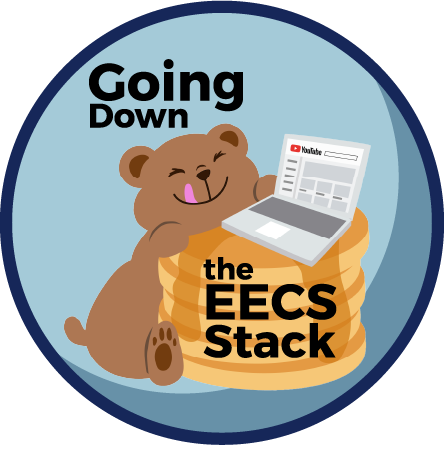
Going Down the EECS Stack
With so many EE and CS classes at Berkeley, it is important that students know which classes best match their personal and career interests. This DeCal is offered to provide students with a broad survey of topics within EECS and a general sense of the courses and subfields within the major. We aim to cover each topic in totality, so no EE or CS experience is required.
If you have any questions, please feel free to reach us at decal@hkn.eecs.berkeley.edu!
Apply Now!Learn MoreKey Learning Outcomes
This course will take students on a journey through the fields of EE and CS starting from the browser request to the underlying circuitry and physics in computers. Each week will move lower on the software/hardware stack, with a deconstructive approach to software and a constructive approach towards hardware. After taking this course, students will have a fair understanding of every level of the EECS stack.
Methods of Instruction
Sessions will consist of 2 hours of instruction, including a mix of interactive labs/demonstrations and lecture. In addition, staff will plan trips to various research labs or host talks by current researchers in applicable fields to provide deeper insight into various areas of research. The syllabus itself covers 11 weeks of instruction, including guest lectures by either faculty or a current researcher, lab tours, and other activities!
Assignments and Grading
To pass the course a total of 19 points must be obtained by each student. Attendance and weekly submissions are worth 1 point each (there are 11 classes and 10 weekly assignments). There will also be a field trip and a final project, both of which are mandatory. For students who are unable to attend the field trip, there will be an alternative assignment.
How to Enroll
Fill out our short interest form: https://hkn.mu/decalapp by Friday, January 31 (1/31). Lectures will be every Tuesday from 6:00-8:00 PM at Dwinelle 79. Please apply as soon as possible; applications will be processed on a first-come-first-serve basis. Please make sure to attend the first lecture, as we will be handling course codes based on attendance. If you cannot make the first class, send us an email at decal@hkn.eecs.berkeley.edu.

Introduction - Week 1

Human-Computer Interaction - Week 2

Video and Image Processing - Week 3

Machine Learning - Week 4

Security and Cryptography - Week 5

Computer Theory and Research - Week 6

Systems - Week 7

How to Build a Computer - Week 8

Electronic and Photonic Devices - Week 9

Embedded Systems & Robotics - Week 10

Conclusion/Ethics - Week 11
Facilitators
Meet the people who will be interacting with you throughout the semester!

- I love Decal!

- I love Decal!

- I love Decal!

- I love Decal!

- I love Decal!